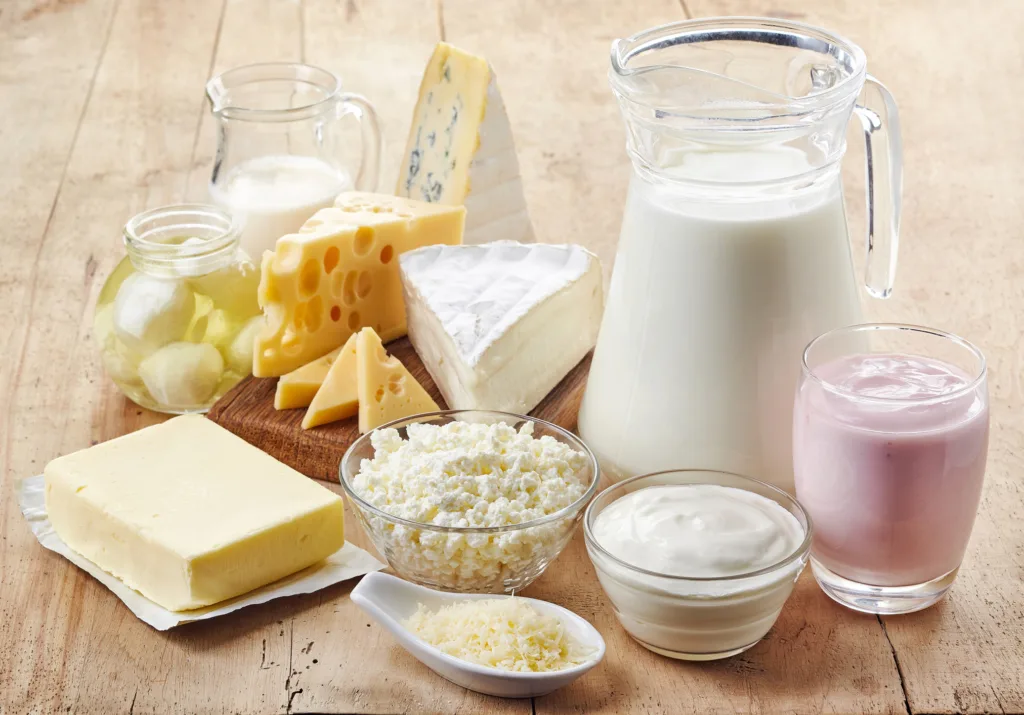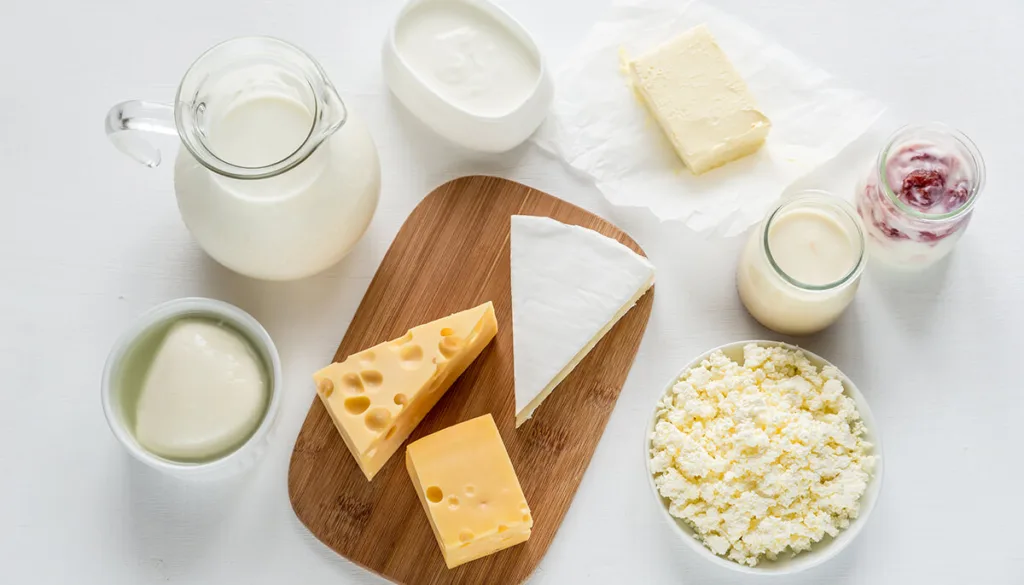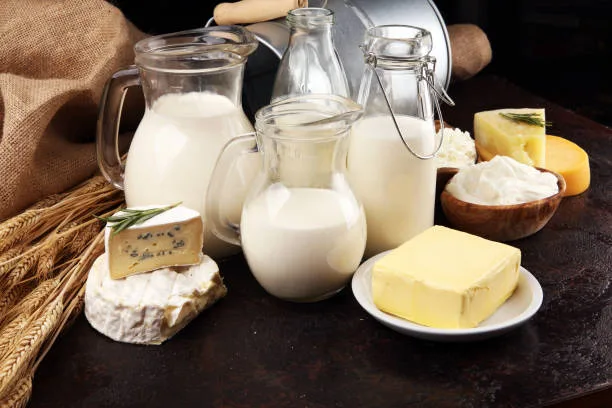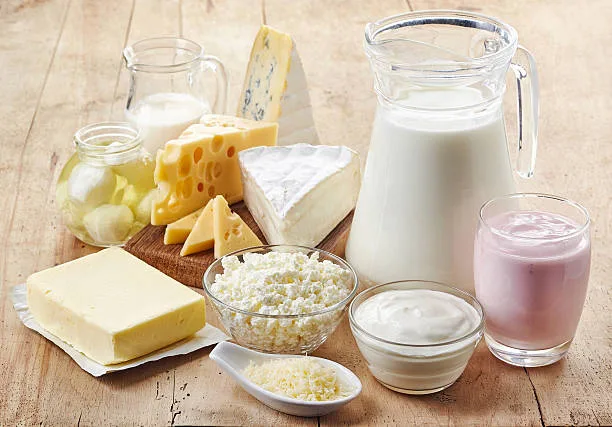The Dairy Dilemma: Exploring How Dairy Affects Your Weight Loss Journey
If you’re anything like me, dairy is a huge part of your daily diet. I love starting my mornings off with a bowl of yogurt, cereal and milk. A grilled cheese sandwich always sounds amazing for lunch. And what’s dinner without a slice of melting cheese on top?
But when I decided it was time to lose 20 pounds, I wasn’t sure if all those milky, cheesy, creamy foods were helping or hurting my weight loss efforts.
It seemed like everyone had a different opinion on whether dairy aids weight loss or causes weight gain. My fitness-buff co-worker insisted that dairy is fattening and I should avoid it altogether when trying to slim down. Meanwhile, my nutritionist cousin swore that dairy provides essential nutrients that can boost fat burning. So who was right?
The truth is, the link between dairy and weight loss is complex, and the research is still evolving. There are a lot of myths, misconceptions and mixed messages out there about how dairy affects your body composition and dieting results.
In this in-depth post, I’ll clear up some of the dairy dilemmas by taking a deep, honest look at the latest science on how dairy impacts weight management. Are some types of dairy better than others for losing fat? Does going dairy-free help you slim down faster? What nutrients in dairy influence metabolism and appetite?
Whether you currently fill up on dairy or avoid it, this info will help you understand if and how to incorporate dairy as part of an effective weight loss diet. Let’s tackle some common dairy debates and uncover smarter ways to achieve your health goals. The first dairy myth we need to tackle…

Is All Dairy Fattening, or Do Some Types Support Weight Loss?
One of the biggest dairy misconceptions is that all dairy products, including nonfat and low-fat varieties, lead to weight gain due to being high in fat and calories. So is it true that loading up on milk, cheese and yogurt packs on pounds no matter what?
This is an oversimplified view that doesn’t match current research. Yes, full-fat dairy contains more calories, and things like butter, cream, and whole milk could stall weight loss if you eat them in excess. But numerous studies have found that moderate intake of low-fat dairy foods is linked to fat loss, not fat gain.
One study had people cut 500 calories from their diet while eating 3-4 servings of yogurt or other low-fat dairy a day. The dairy group lost significantly more weight, body fat and inches from their waist. Research suggests the nutrients and protein in dairy may balance out the extra calories.
So while I love whipping up an occasional bowl of ice cream as a treat, I mainly stick to nutrient-packed, low-calorie dairy foods like Greek yogurt, cottage cheese, and low-fat string cheese when trying to slim down. Things like butter and cream are reserved for special occasions rather than daily snacks.
The bottom line is that not all dairy deserves a bad rap when it comes to weight control. In fact, incorporating more nonfat and low-fat dairy could give your weight loss a boost while providing essential nutrients!
Can Cutting Out Dairy Help You Lose Weight Faster?
Dairy gets blamed for weight gain so often that it’s become trendy to cut it out completely when trying to lose weight fast. I’ve known people who eliminated all dairy for months hoping it would lead to quick, dramatic fat loss. But does ditching your yogurt, milk and cheese actually help you slim down?
According to research, there’s no solid evidence that going completely dairy-free accelerates weight loss. One study had overweight people cut 500 calories per day while sticking to either a high-dairy or dairy-free diet. After 12 weeks, the high dairy group lost significantly more weight and body fat.
This matches my personal experience. When I tried cutting out all dairy for 3 weeks, I didn’t notice any boost in my weight loss compared to when I include low-fat yogurt, cottage cheese and part-skim mozzarella as protein sources.
Of course, cutting out full-fat dairy treats can help reduce excess calories that could stall your efforts. But removing nutrient-rich, moderately caloric dairy seems to have minimal benefit. Nonfat milk and yogurt provide protein, calcium and fluids to help manage hunger.
Unless you have a medical reason to eliminate dairy entirely, the current research doesn’t support doing so as an effective shortcut for shedding pounds. Your best bet is to make low-fat or nonfat dairy a conscious part of your diet rather than banning it.

Does Dairy Cause Inflammation That Prevents Weight Loss?
Here’s another common dairy myth: that it promotes widespread inflammation in the body which interferes with weight loss. Some claim dairy triggers inflammatory markers which can exacerbate obesity. Is there any truth to the inflammation accusations?
The evidence linking dairy and inflammation remains weak. Most studies find that dairy has neutral to anti-inflammatory effects, especially full-fat yogurt. Unless you have a diagnosed sensitivity, dairy doesn’t seem to impact inflammation levels enough to hinder fat loss.
Personally, I aim for a nonfat plain Greek yogurt every day for the probiotics that improve gut health and potentially reduce system-wide inflammation. I definitely avoid highly processed cheeses because these contain inflammatory compounds.
But choosing fresh, active yogurt cultures and unprocessed cheeses in moderation seems beneficial rather than inflammatory. Combined with an overall anti-inflammatory diet, dairy doesn’t have to be villainized for inflammatory effects.
How Can The Calcium and Protein In Dairy Aid Weight Loss?
Enough debunking myths, let’s talk facts! Two components of dairy that have legitimate fat-burning benefits are calcium and protein. Here’s an in-depth look at how these dairy nutrients can help accelerate your weight loss efforts:
Calcium’s Role in Fat Burning and Metabolic Rate
Calcium is a superstar when it comes to supporting a lean body composition. Over a dozen studies have found that dieters with the highest calcium intakes lose the most belly fat and body weight overall.
Researchers believe calcium’s fat-fighting effects come from:
- Increasing breakdown of body fat while blocking new fat production and storage. Calcium acts directly on fat cells to support burning fat rather than accumulating it.
- Optimizing metabolism by reducing levels of parathyroid hormone and calcitriol which are linked to obesity. Calcium intake has a direct dose-dependent relationship with metabolic rate.
- Binding to fatty acids in the digestive tract so less fat is absorbed from food. This mechanism can lower the actual number of calories you obtain from a high-fat meal.
- Regulating appetite and food intake by controlling hormones that signal satiety and hunger. Getting enough calcium means you feel fuller faster while eating fewer calories.
When it comes to calcium content, dairy products have the most well-absorbed forms rather than plant sources of calcium. Just one cup of yogurt provides 30% of your daily calcium needs.
To maximize dairy’s fat-burning calcium, include at least 2-3 servings of low-fat dairy like yogurt, milk and cottage cheese in your daily diet. This offers the ideal amount to optimize your body’s fat breakdown while curbing calories.
Dairy Protein Keeps You Feeling Fuller Longer
Another benefit of dairy for weight loss is that it provides a hefty dose of satiating protein to keep hunger pangs away. Consuming protein-rich dairy foods promotes fat loss by:
- Increasing feelings of fullness and improving satiety between meals. The high protein keeps you satisfied on fewer calories and prevents overeating.
- Stabilizing blood sugar by minimizing spikes and crashes. Whey protein in particular has a low glycemic index for fat-burning effects.
- Boosting thermogenesis, or calorie burn, because protein requires more energy to digest than fats or carbs. Your metabolism gets a mild uptick.
- Sparing loss of valuable lean muscle as you shed pounds. Milk protein contains leucine which is key for building muscle.
The best high protein dairy options are Greek yogurt, cottage cheese, milk and cheeses like Parmesan. Shoot for at least 25 grams of protein from a mix of dairy and plant sources at each meal to promote satiety.

Probiotic Dairy Foods Support Gut Health and Weight Loss
Probiotics have become a popular supplement touted for all sorts of health benefits, including better weight control. These beneficial live microorganisms can influence weight by improving gut health. Think of your digestive system as a major contributor to your metabolism!
The good news is that several dairy foods naturally contain probiotics. Regular intake of probiotic-rich dairy may aid weight loss through:
- Balancing the gut microbiome by increasing levels of beneficial bacteria that improve digestive function and immunity. An unhealthy gut environment is linked to weight gain.
- Potentially reducing appetite and fat storage by optimizing levels of hunger hormones like ghrelin. Probiotics may also limit the enzyme lipoprotein lipase which promotes fat production.
- Lowering systemic inflammation since probiotics decrease inflammatory compounds in the gut. This provides protective effects against inflammation-driven obesity.
- Improving insulin sensitivity and blood sugar regulation. Probiotics help blood sugar stabilization so your body can switch easily into fat burning mode.
Yogurt, kefir and some aged cheeses like gouda and cheddar provide a hefty probiotic punch from cultures like lactobacillus and bifidobacteria. Enjoy them as part of a high fiber diet to feed the good bacteria.
Are Nonfat and Low-Fat Dairy Misleadingly Healthy?
This exploring of dairy and weight loss wouldn’t be complete without asking: are nonfat and low-fat dairy options actually healthy? Or are they highly processed Frankenfoods disguised as diet-friendly?
It’s true that some low-fat dairy products have additives and thickeners for texture, and they aren’t always the “cleanest” options. However, research indicates that:
- Most low-fat dairy isn’t as processed as people assume. Things like skim milk and nonfat Greek yogurt just have the fat removed rather than added ingredients.
- Fortifying low-fat dairy with vitamin D and A has benefits like improving nutrient absorption to support your health goals.
- Nonfat milk actually has a higher percentage of protein compared to full-fat versions. More protein assists with fat loss.
- People who eat mainly low-fat dairy have lower rates of weight gain and metabolic disorders. The benefits seem to outweigh any concerns.
When choosing lower fat dairy options, I always check the label to avoid unnecessary additives and look for fortification with beneficial vitamins and minerals. Things like nonfat milk and plain Greek yogurt offer nutritional advantages that support weight control.
Overall, research indicates that nonfat and low-fat dairy provide tangible benefits for fat loss and metabolic health. They aren’t just imposters bamboozling dieters! Combined with other whole foods like fruits, veggies and lean protein, they can be part of healthy, sustainable weight loss plan.
Can You Still Get Dairy’s Benefits from Non-Dairy Alternatives?
With so many people avoiding dairy due to allergies, intolerances or diets like veganism, getting the nutritional benefits of dairy from plant-based alternatives has become popular. But are substitutes like almond milk, coconut yogurt and vegan cheese comparable when it comes to weight management?
Here are some tips for maximizing nutrition if opting for dairy-free alternatives:
- Seek out unsweetened, fortified varieties to avoid added sugars and get key nutrients like calcium, vitamin D and B12. Sweetened versions often have little nutritional value.
- Compare protein content, and choose higher protein options made from soy, peas or blends. Low protein makes it harder to feel full and retain muscle.
- Add a daily probiotic supplement if dairy is your main source of probiotics currently. These support digestive and metabolic health.
- Consider a calcium supplement since plant milks contain much less absorbable calcium than dairy. Aim for at least 500 mg daily.
- Stick to whole food sources of fat like nuts and avocados rather than relying on high-fat vegan cheeses and creams.
While you may have to be a savvier label reader, with a few tweaks it’s possible to get nutrients that support weight loss goals even from dairy-free diets. You just need to be a little more intentional.
Real People Share Their Success Stories of Losing Weight With Dairy
Wondering if dairy can really help support major weight loss journeys and body transformations? Let the success stories of real people inspire you!
Amber J. managed to lose 25 pounds after her second pregnancy by making Greek yogurt, string cheese and skim milk nutritious staples. She explains:
“After struggling for months to lose my baby weight just through calorie cutting alone, I finally started being more mindful about adding high-protein, high calcium foods like yogurt and cheese into my diet. Having a filling snack like string cheese really helped curb my appetite between meals, making it easier to stick to my calorie goals for the day rather than overeating.”
Mark S. lost over 40 pounds in 5 months while still eating cottage cheese before bed every night. He says:
“I had tried eliminating cottage cheese thinking it must be slowing my weight loss since it’s higher in calories, but my progress stalled. When I added it back in as a daily nighttime snack, the weight started coming off faster. I think the combination of protein and calcium really helps my body burn fat even with the extra calories.”
Jessica L. credits her 3-a-day yogurt habit for helping her lose 15 pounds without intense dieting. She explains:
“Eating 3 servings of low-fat yogurt daily really helped me lose weight without major calorie cutting. I think the nutrients ramped up my metabolism, and the probiotics improved my digestion. I had way less bloating. I’ll definitely keep yogurt as a staple even when I’m done losing weight!”
The big takeaway from these success stories is that dairy’s combination of protein, calcium, probiotics and nutrients provides tangible weight loss benefits. When enjoyed mindfully as part of balanced diet, dairy can accelerate your results!
How I Lost 20 Pounds While Still Enjoying Dairy Every Day
After months of research and personal experimentation, I’ve learned that dairy can absolutely be part of an effective weight loss diet. In fact, it provides key nutrients that support my goals. Here are the strategies that worked for me:
- Choosing nonfat Greek yogurt as my go-to breakfast paired with fruit and nuts for fiber and healthy fat. The protein keeps me full for hours!
- Snacking on a Sargento light string cheese or Babybel rounds in the afternoon for a protein-packed energy boost.
- Opting for 25-30 grams of protein from dairy, eggs or plant sources with each meal and snack to stay satisfied on fewer calories.
- Enjoying a bedtime snack of cottage cheese with tomato and avocado when late-night hunger strikes. The casein protein prevents overnight muscle breakdown.
- Drinking skim or 1% milk rather than sugary juices or soda for fluids and nutrients without excess calories.
- Sticking to a daily probiotic yogurt for better digestion and potential metabolism-boosting effects.
By making smarter dairy choices while controlling portions, I lost over 20 pounds without having to eliminate it. My energy is great, and I don’t feel deprived. Not bad for a major cheese lover!

The Bottom Line: Should You Eat Dairy for Weight Loss?
If you avoid dairy because you assume it will set back your weight loss goals, it may be time to rethink that strategy. Current research shows that incorporating nonfat and low-fat dairy can provide nutrients that enhance fat loss and support a healthy metabolism.
With the exception of heavy creams and fatty cheeses, dairy does deserve a place in your weight control diet. Just be mindful of portions and choose nonfat, low sugar options. If enjoying dairy as part of balanced nutrition, it boosts rather than blocks your path to a fit physique!
Of course, no one food alone will magically melt the pounds off. A sustainable approach includes strength training, cardio exercise, stress management, quality sleep and an overall balanced diet. But dairy provides key ingredients to complement healthy habits.
I hope this dairy deep dive gave you fresh insights on how to utilize it for reaching your body goals. Stay tuned for more research-backed articles to help you on your health and wellness journey!
Thank you for reading this post, don't forget to subscribe to our free newsletter
!
